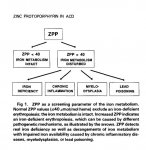TheMoonIsBlue
Senior Member
- Messages
- 442
I apologize in advance for this vague question......is there any way to explain to a DOCTOR the theory (which I believe is true) that in ME/CFIDS, all the viruses and infections in the CNS, etc., basically create a "Massive Inflammation" in the body/brain?
Doctors will run the basic Sed Rate and C-reactive protein....which is always normal (actually LOW for me) so they will think-no inflammation.
What about Inflammation in our BRAINS??
Is there any ways to broach this subject without sounding nuts? Are there any links anyone can provide that explain this theory at all?
Thanks everyone
Doctors will run the basic Sed Rate and C-reactive protein....which is always normal (actually LOW for me) so they will think-no inflammation.
What about Inflammation in our BRAINS??
Is there any ways to broach this subject without sounding nuts? Are there any links anyone can provide that explain this theory at all?
Thanks everyone

